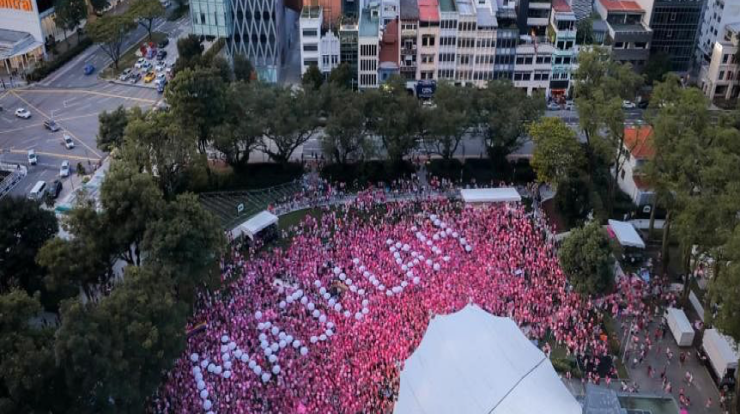Asia Thinkers discuss the repealing of 377A and the implications for Singapore society, with many citizens feeling that the removal of the law will impact key family values, while others feel it does not go far enough.
Singapore’s Penal Code 377A was introduced by the colonial government, making sex between men illegal and effectively criminalising gay men. Repealed in November 2022, the Government further introduced an amendment to the constitution enshrining the definition of marriage as between a “man and a woman,” blocking further constitutional change.
The debate over repealing 377A has been going on for some years following the Indian Supreme court’s decision to strike down a similar section of the Indian Penal Code in 2009. Since then, Singaporeans have been challenging the constitutionality of Section 377A with numerous petitions and court challenges to bring Singapore in line with the rest of the world. For many Singaporeans, the repeal of 377A turns the page on a dark chapter of Singapore’s social history that has been rarely discussed.
A time when gay men not only faced intense social stigma but also were actively targeted by authorities. As one gay activist commented, “while anti-gay violence was not common, many in the community were fearful of coming out to society.”
By the 2000s the raids had decreased, and the issue of homosexuality became increasingly openly discussed. Then in 2007, in a landmark parliamentary debate over 377A, Singapore’s government promised that while it would keep the law, it would not be enforced. These moves came as Singaporeans slowly became more accepting of LGBTQ+ people.
The city-state has since developed an LGBTQ scene, with an increasing number of LGBTQ+-friendly establishments. The biggest annual gathering in Singapore is Pink Dot, an LGBTQ+ rights event that draws thousands of supporters every year. Activism has become more prominent with lobby groups and communities emerging to provide support.
Repealing of 377A
In August 2022 Prime Minister Lee Hsien Loong announced the government would debate repealing 377A. The government had been advised that future court challenges might succeed in striking 377A down. The PAP government decided to take action and announced it would repeal 377A. The public reaction was mixed, although Singapore remains a very conservative society, recent public surveys have confirmed attitudes have shifted and gay people are better accepted in Singapore, especially among younger Singaporeans. There is a general acceptance that a person’s sexual orientation and behaviour are a private matter, and even many of those who want to retain 377A do not want to see it being actively enforced and criminal penalties applied. The LGBTQ+ community welcomed the announcement that action was finally being taken
Finance Minister Lawrence Wong named as the leader of the fourth generation, or 4G, of Singapore’s political leadership, paving the way for him to become the country’s next Prime Minister, also commented in an interview with Bloomberg that
the matter of whether to repeal a law that criminalises sex between men is not an issue about the law itself, but the broader societal concerns over family and marriage,“It is about how we organise ourselves as a society, whether or not values around family, around marriage will be changed, and those are the concerns that the larger segment of Singaporeans is concerned about,”
He added that while opinions about the criminalisation of homosexual behaviour have evolved over time, people have strong views about family and marriage, which he stressed is a separate matter. In a further interview reported in “Today,” he further commented that “in regard to Section 377A repeal a matter of ‘doing what is right’, not about political costs.”
Religious groups such as the “Council of Churches” cautioned against the repeal of Section 377A, rejecting any normalisation of homosexuality and denounced “attempts to change Singapore’s norms on marriage and family”. Citizen activist groups such as “Protect Singapore” organized meetings to raise awareness, believing it put the current institutions of marriage and family at stake, while LGBTQ+ activists call for their redefinition of family to include same-sex couples based on equality.
A supporter of “Protect Singapore” told Asia Thinkers, “I do not feel that there is any right time to support repealing of 377A. In my view, Singapore laws should be based on Christian moral standards. These laws should be the foundation of our family values.”
Singapore’s Reaction
Following the repealing of 377A in November 2022 and enshrining the definition of marriage between a man and woman in the constitution, the support among Singaporeans still remained split. Activists commented that the definition did not bring equality, and LGBTQ+ people won’t be able to marry and challenge laws flowing from the definition of marriage relating to housing, and education thus violating their civil liberties. As one LGBTQ+ supporter said, “Section 377A is gone, the discrimination that it legitimized with its existence is still here to stay and those supporting LGBTQ+ rights will continue to fight on.” Others called this “disappointing” and warned that it would only further entrench discrimination in society.
Ms Pauline Ong, an executive Pastor at Free Community Church, agreed with the shift, and she is “hopeful that one day our laws will reflect the just, inclusive and equal society that we strive to be”.
Conservative groups such as” Protect Singapore” said that they were “deeply disappointed” that the repeal was going ahead without assurance of further “comprehensive safeguards for family.” The Alliance of Pentecostal and Charismatic Churches of Singapore (APCCS), which represents over 80 local churches, expressed disappointment with the government’s decision to repeal Section 377A. However, the alliance said that it welcomes the move to amend the Constitution to protect the definition of marriage.

Pink Dot’s 2019 event. (Photo: Pink Dot/Facebook, yan.dao.kia/Instagram) Parliamentarians must continue to be ‘voice of the community, says Pink Dot.
Constitutional Issues
The passing of Article 156 gave Parliament the power to protect and promote the institution of marriage, but also raised a debate on the rights of Singaporeans to challenge in court the definition of marriage or legislation which relies on the definition of marriage such as the right to housing, which directly affects the LGBTQ+ community.
The key clause in part (1) of the Article is that Parliament has the power to define, regulate, protect and promote the institution of marriage – and such definition by Parliament will not be subject to legal challenge.
SMU Associate Professor of Law, Eugene Tan, said the intention is to “significantly reduce the likelihood of constitutional challenges on laws and government policies that are premised on marriage being that between a man and a woman”. “The provision makes it plain and clear that what a marriage is for Parliament to decide, Article 156 would make such challenges an “uphill task.”
Christian Han, an LGBTQ+ activist and journalist argues in her Newsletter, “We. The Citizens,” that “apart from the discrimination although that in itself is a big enough problem, this constitutional amendment is yet another example of the PAP government ousting the judiciary from their legitimate role of providing a check and balance as a branch of government. It should be the right of every person who feels like they have been treated in ways that violate their constitutional rights to be able to bring a case to the courts for deliberation.”
Activists have already begun their efforts to realize goals beyond the repeal of 377A. A conference has been organized entitled “Beyond Repeal Conference 2023” to discuss the government’s definition of marriage and to promote equality for all citizens.
Perhaps the final word should go to Prime Minister Lee Hsien Loong commenting in a posting on Facebook “that the amendment and repeal were a major milestone for Singapore. This is a deeply felt and sensitive issue, and could easily have become a very divisive one. But we have not allowed it to divide us. Instead, we have handled it responsibly and thoughtfully and held everyone together.”

